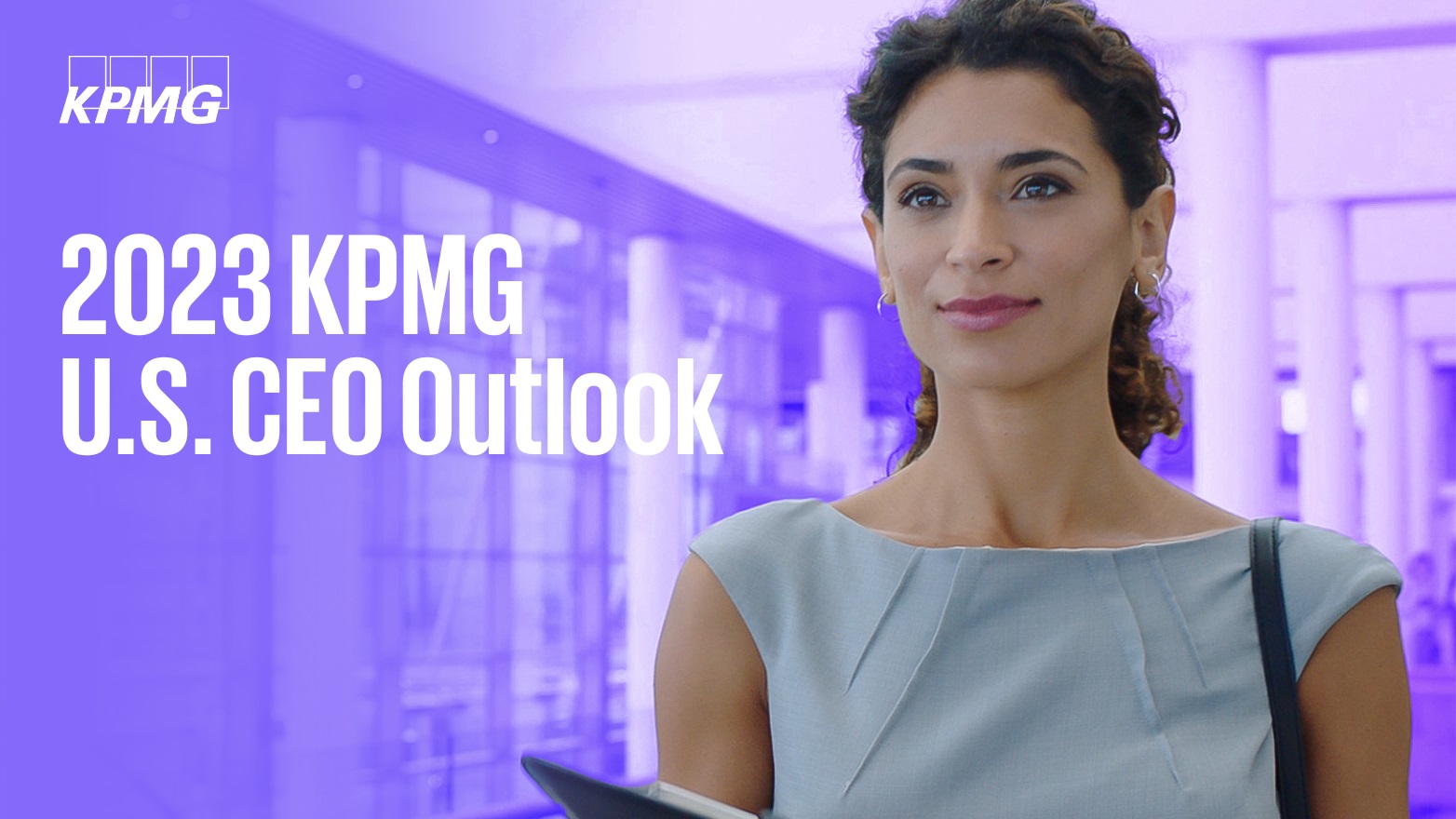As technology transforms the workforce, American workers want organizations to define work on human terms
Findings from the KPMG American Worker Pulse Survey 2023.
American workers know that new technologies will continue to dramatically change how they work, but they still expect employers to be responsive to their needs, according to the new KPMG American Worker Pulse Survey 2023 report. In fact, 75% of survey responders said that technology and artificial intelligence will automate some portion of their job, while 72% of executives and senior managers said that advances in technology will significantly impact their role. The survey also showed that American workers are keen to hold their ground on the gains to work-life balance made in recent years, with 69% of respondents saying that a reduced work week would improve work-life balance, with 74% of Millennials agreeing.
"Organizations must find the delicate balance between embracing technologies, including generative AI, for productivity gains and protecting employee well-being,” said Felicia Lyon, Principal, Human Capital Advisory, KPMG LLP. “The workforce is pragmatic about the changes, but they hope their organizations prioritize their development, and support their well-being. Employers must take key actions now to prepare for technology transformation and retain valuable talent."
The report, that highlights data from more than 1,800 U.S.-based employees across industries, outlines 5 key findings and explores key actions that employers can take on now to help their organizations best prepare their employees for technology transformation, deliver the best employee experience, and retain and support valuable talent.
5 Key Findings from the KPMG American Worker Pulse Survey 2023
1
Middle managers will be vital change agents.
2
Some see technology as a “friend,” others as a “foe.”
3
Work-life balance remains important.
4
Workers are future-ready, but not quite bought in.
5
Explaining the upskilling agenda will help.
1. Middle managers will be vital change agents.
Middle managers will play a crucial role in translating high-level workforce transformation visions into productive action on the front lines. They will need to balance humans and generative AI at work and ensure that employees stay connected to the mission and purpose of the organization. However, executives will depend more on middle managers to take the pulse of their teams, communicate goals, and reinforce what is working.
- 59% of executives/senior managers and 31% of middle managers said that their job will become obsolete within three years due to technology.
- 61% of executives/senior managers and 37% of middle managers said technology had already affected their work-life balance negatively.
"Middle management must evolve from command and control to a coach mandate, embracing tech-supported change and empowering the workforce through self-determination and professional development to avoid becoming obsolete," added Lyon.
2. Some see technology as a “friend,” others as a “foe.”
The survey shows that most workers believe technology will bring significant changes to the workplace, with the overall sentiment towards new technology in the workplace being positive. The survey also highlights concerns about increased workload and work-life balance, with over 40% of Gen Z and Millennial respondents worrying about unmanageable workloads and negative impacts on work-life balance.
- 75% of respondents believe that technology/AI will automate some portion of their job.
- 68% of Millennials believe that tech will enhance their productivity. Overall, 63% of respondents agree.
"Addressing workforce concerns and empowering employees to redefine how work gets done can harness worker optimism about the prospects of technology, leading to productivity gains," said Lyon.
3. Work-life balance remains important.
Workers are keen to maintain the work-life balance gains made in recent years but are concerned that technology may affect their personal time. Remote work has become a polarizing issue, with some organizations viewing it as a primary employee perk, while others are conceding to it for now. Respondents cited a reduced work week and more flexibility for non-work needs as other solutions organizations could offer to support a healthy work-life balance.
- 69% of respondents said a reduced work week would improve work-life balance, with 74% of Millennials agreeing.
- 44% of respondents who identify as men express a preference for working fully at an office versus 32% of those who identify as women.
"Managing a virtual team requires an inclusive approach that addresses cultural and professional impacts while acknowledging the workforce's need for flexibility,” said Lyon. “Leaders are better off supporting team members through mentoring and flexible work schedules."
4. Workers are future-ready, but not quite bought in.
Workers are confident in their ability to adapt to changes in the workplace and believe their employers will support them in learning new skills. However, a significant minority of respondents do not feel their current job aligns with their organizations’ strategy and purpose. Additionally, some employees feel they do not have the same access to information as their colleagues, potentially hindering collaboration and productivity. Respondents anticipate that collaboration and teamwork will continue to grow in importance in the next three years. Younger generations prioritize mental health in the workplace and believe their leaders will prioritize it as well, while older generations are less convinced.
- 71% of respondents agree that “the mission and purpose of my organization make me feel my job is important.”
- 72% of respondents agreed that their current job is aligned to their organization’s strategy and purpose.
"Transparency, communication, and workforce ownership are key to building trust in an organization,” added Lyon. “Collaborative teams that embrace innovation and purposeful work yield long-term benefits."
5. Explaining the upskilling agenda will help.
The survey found that while most workers are aware that technology will change the workforce, 25% of respondents did not expect that technology or artificial intelligence would affect their jobs at all in the future. However, 42% believed AI and automation would cause job displacement and the most disruption to the workforce in the future. A large majority (81%) remain confident that their current skills will fit future jobs, but where new training is necessary, younger generations are more optimistic than baby boomers that their organizations are actively investing in reskilling to help bridge the skill gaps. The survey also found that offering the right training is critical, with a decline in satisfaction with learning and development opportunities in organizations.
- 74% of executive and senior-manager respondents say their organizations will proactively invest in reskilling, and 80% are confident they will use the latest technology to do it.
"Organizations committed to human-tech coworking invest in upskilling for future roles, achieving productivity gains and managing workforce anxiety,” said Lyon. “Transparency and trust are key to designing successful career paths."
Generative AI has the potential to revolutionize work methods, but American workers are concerned about how it will affect their jobs. Organizations can ease this uncertainty by involving their workforce in creating the human/tech roles of the future. Middle managers can play a role as coach and mentor, helping employees realize their creative potential. By leading with people in mind, organizations can benefit from their generative AI strategy while retaining a skilled workforce.
About the survey:
KPMG surveyed more than 1,800 U.S.-based employees representing multiple industries including consumer and retail, healthcare & life sciences and financial services. Survey participants worked for organizations with at least 5,000 employees, and more than 50% worked for companies with at least $1 billion of revenue.
To learn more about the KPMG American Worker Pulse Survey 2023 report, or to arrange an interview with Felicia Lyon, please contact Andreas Marathovouniotis.
Explore more

KPMG Study: CEOs Focused on Game-Changing Investments in M&A and Generative AI to Drive Growth
CEO Confidence in Long-Term Growth Prospects of Their Companies More Subdued. Myriad Risks to Growth include Geopolitics and Political Uncertainty, Disruptive Technology

KPMG 2023 Consumer Technology Survey
Some hesitation remains regarding Gen AI’s use in creative content, according to the findings of KPMG's latest survey.

KPMG's 2023 U.S. Talent Trends Survey
The majority of white-collar workers don’t feel generative AI is an immediate threat to their jobs; want to be upskilled.